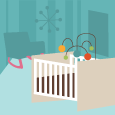March 2015 Moms
 kcbizme
member
kcbizme
member
SS Post: Day Care/Child Care Questions
I am looking into licensed home child care providers, and I wanted to know if you lovely ladies have any suggestions on what questions I need to be asking when I contact these people. I'm completely clueless.
Thank you in advance!
This discussion has been closed.





Re: SS Post: Day Care/Child Care Questions
I'd ask if there are frequently other adults in the home while the kids are there and who they are.
I'd do a really thorough tour - where do the kids nap, where do they eat, places to play.
Definitely ask how many kids they are licsened for and how many they actually accept.
Enrollment
What is the center's licensed capacity?
Do you have space for my child? If not, can we get on a waiting list, and how long is it?
How large is the group my child would be in?
What's the caregiver-child ratio in each group?
Are classrooms combined toward the end of the day to save on staffing?
Costs
What are the fees?
Do we have to pay to “hold our spot” over summer break?
How and when would you bill us?
Do you offer sibling discounts?
Is there a late-pickup fee/policy?
Supplies
What supplies would I need to bring for my child?
Interacting with parents
Do you encourage visits from parents?
What do you expect from me as a parent?
How do you communicate with parents? Is there a regular newsletter or a notice board? Is there a daily report or another way you inform parents of what children did during the day (naps, bottles, BMs, etc.)?
Do you encourage parent/provider conferences?
Staff and qualifications
How many full-time caregivers do you have? Part-time?
How do you screen staff? Do you perform background checks before hiring?
What are the staff's credentials and training? Emergency training? First aid? CPR? SIDS?
What is the turnover rate?
Health
Must children be immunized in order to attend?
What is your sick-child policy?
What if my child needs medication during the day?
Hygiene
How often are the toys cleaned and replaced?
Safety
How are indoor and outdoor play areas childproofed and escape-proof?
Are the doors secure so strangers can't just walk in?
What is your release policy?
What is your disaster plan? Do you have procedures for handling fires, earthquakes, intruders, and other emergencies?
Is there a video monitoring system? Can tapes be reviewed upon request?
Are swings, bouncy seats, etc used and for how long/how often are they permitted?
Eating
Do you provide breakfast, lunch, and/or snack? If yes, what kind?
If not, what kind of food should I bring for my child? Are there any food restrictions?
Can we provide food from home if that is our preference?
Do you have a refrigerator for storing bottles of breast milk or formula?
Do you feed babies on demand or on a schedule?
Nap times
What is the nap schedule?
Where do the children sleep?
Do you place babies on their back to sleep and follow other safe sleeping practices to reduce the risk of SIDS?
What do you do if a child does not wish to sleep during nap time?
Things to Consider
Basics: A good daycare center has been in business for a while and has solid, up-to-date credentials, clear rules and regulations, and firm policies on operating hours, pickup and drop-off times, and when children are too sick to attend.
Size: Look for a center with small groups of children and plenty of staff. The National Association for the Education of Young Children recommends having one caregiver for every three to four babies, and no more than eight babies in a group; one caregiver for every four to six children between the ages of 2 and 3; and a staff-to-child ratio of 1:8 to 1:10 for 4- and 5-year-olds.
Staff: Employees should be educated, with at least two years of college, a background in early childhood development (although many states don't require this), and CPR and other emergency training. The center should provide ongoing staff development in early childhood education. Caregivers should be responsible, enthusiastic, and well prepared, sharing your philosophies on key child rearing issues such as sleep, discipline, and feeding. A center with good staff benefits is likely to have less caregiver turnover, which means consistent care for your child.
Activities: A good daycare center will have a well-thought-out daily schedule with a variety of activities. The program should be changed regularly so children have a chance to learn new skills and don't get bored. Television and other forms of screen time should play little or no part in the day's routine.
Social Skills: A good daycare program teaches children to begin to take care of themselves and to respect other children and adults. Providers should help children learn how to express themselves appropriately, discipline them kindly, and encourage their good behavior.
Health, Hygiene, and Safety: A good daycare center is clean and sanitary and observes basic safety rules. If you see poorly maintained equipment or the place seems dingy or cramped, keep looking.
Food and Sleep: If the daycare center provides food, make sure it serves nutritious meals (covering all four food groups) and snacks. For sleeping, bedding should be fresh and firm (to reduce the risk of SIDS for babies) and nap areas should be clean and quiet.
Additional considerations: Be sure to take a moment to ask yourself the following questions when you visit.
Do the staff and children seem happy and engaged?
Do caregivers cuddle babies? Talk directly to the children? Is their tone friendly and caring?
Are crying children responded to immediately?
Is the daycare center clean and pleasant?
Is the bathroom a pleasant setting, encouraging children to use it?
Are appropriate safety measures (fire extinguisher, first aid kit, fences, etc.) in place?
During the hours you and your child are apart, will you feel at ease knowing your child is in this setting?